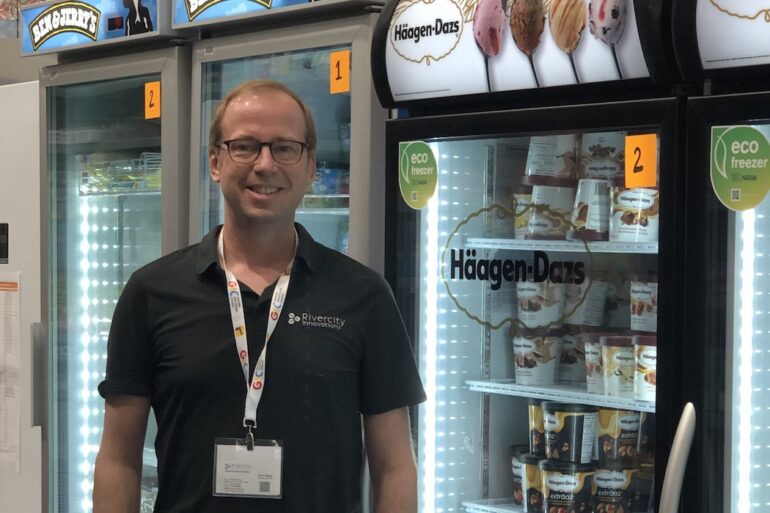Saskatoon-based Internet of Things (IoT) startup Rivercity Innovations (RCI) has secured $2 million CAD in funding as it looks to help more restaurants, stores, and pharmacies in Europe and the Persian Gulf avoid food spoilage.
The funding came as part of a round led by Calgary-based StepChange Capital, with participation from returning investors Startup TNT and WestCap’s Golden Opportunities Fund. New investors WTC Ventures and Wieger Holdings also participated in the round.
Founded in 2017 by CEO Jeff Shirley and former CTO Lance Pitka, RCI offers sensors that use long-range radio technology (LoRA) to collect data such as temperature, GPS, moisture, and humidity. Unlike WiFi and Bluetooth signals, LoRa requires little power and reaches up to 20 kilometres.
“The client-market and product-market fit is there.”
Jeff Shirley, Rivercity Innovations
The new capital will be used to grow RCI’s sales team, which will focus on expanding the footprint of its “cold chain” monitoring solution in Europe and Gulf region countries, like Dubai, Saudi Arabia, and the United Arab Emirates, Shirley told BetaKit in an exclusive interview.
Grocery stores and pharmacies typically task staff with logging the temperature of fridges and freezers on a clipboard two to three times a day. RCI’s cold chain monitoring sensors digitize this data for decision and compliance requirements, providing early warnings before cooled goods are compromised.
Shirley said that raising the capital speaks to RCI’s long-term growth plan and the reliable nature of the business. He added that he is very happy with the company’s growth over the past year, which was the reason why he could successfully close the round in a tight market.
“We’re at more than 100 percent revenue growth on our [annual recurring revenue], so the client-market and product-market fit is there,” Shirley said. “Our goal with the round is to get the right sales team in place and repeat the enterprise sales cycle processes we are currently doing, and make it better so we can shorten that sales cycle.”
RCI has raised a total of $3.5 million to date, having previously raised a $700,000 seed round in 2021 and an internal bridge round from its existing investors in 2023. Shirley said the company is moving away from “startup nomenclature” but that the round was somewhere between seed and Series A.
The round was the first major investment of its lead investor, StepChange, an early-stage growth capital firm that began operating last year focusing on Western Canadian startups. StepChange managing director Eric Miller will act as RCI’s board chair, and StepChange strategic advisor Trevor MacFarlane will take a board seat as part of the firm’s participation in the round.
Additionally, StepChange is providing RCI with a fractional CFO, CRO, CTO advisor, and an HR management consultant alongside its strategic connections to RCI’s client base, Shirley explained. In an interview with BetaKit, Miller said that StepChange looks for disruptive technologies that can be applied to the natural resource sector and that, while RCI falls into a broad agricultural space, it comes with scalability and addressable global markets.
“This is our inaugural deal, and we’re very, very pleased that we were able to connect with Rivercity because it basically ticked all the boxes,” Miller said in an interview with BetaKit, adding that they got connected with RCI through a mutual contact at the National Research Council. “[Shirley] was looking for an entity like StepChange that would bring that expertise to the table and help the company grow, so I think it was a really good fit.”
RCI still hasn’t fully capitalized on the partnership it struck with fellow Saskatoon startup 7Shifts over a year ago, which was supposed to see RCI deliver temperature monitoring services to 7Shifts’ more than 40,000 clients. Shirley said that part of RCI’s latest funding will put “the right sales persona” behind the restaurant vertical.
RCI is also looking forward to the Q1 2025 launch of a hybrid LoRa IoT-satellite GPS tracking and temperature monitoring solution through its French satellite operator partner Kineis. As part of the partnership, RCI custom-designed a small sensor to communicate with the French satellites to report the GPS positioning and temperature of transoceanic freight shipments anywhere on the planet.
“I have a very small prototype device with a power source for 10 years, and we provide GPS positioning at about one-fifth the conventional cost for GPS positioning today,” Shirley said. “We can provide [customers] that data at a fraction of the cost on a 10-year battery, with a device that is very affordable and uses Canadian and French collaboration technology.”
Feature image courtesy Rivercity Innovations.


